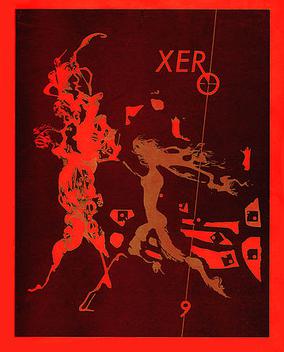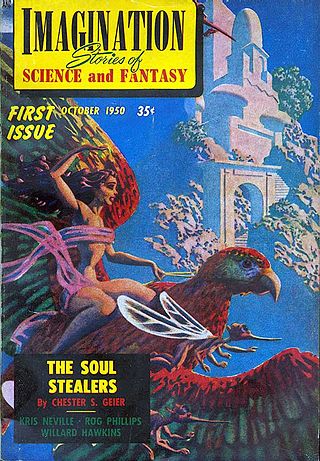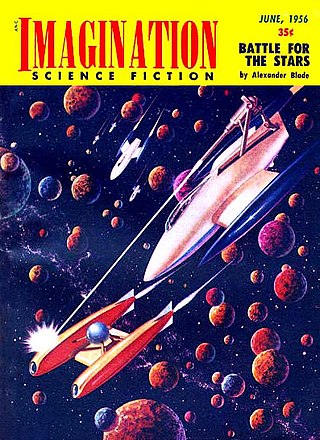Related Research Articles

A fanzine is a non-professional and non-official publication produced by enthusiasts of a particular cultural phenomenon for the pleasure of others who share their interest. The term was coined in an October 1940 science fiction fanzine by Russ Chauvenet and first popularized within science fiction fandom, and from there the term was adopted by other communities.

Science fiction fandom or SF fandom is a community or fandom of people interested in science fiction in contact with one another based upon that interest. SF fandom has a life of its own, but not much in the way of formal organization.

David Rowland Langford is a British author, editor, and critic, largely active within the science fiction field. He publishes the science fiction fanzine and newsletter Ansible and holds the all-time record for most Hugo Awards, with a total of 29 wins.

Science Fantasy, which also appeared under the titles Impulse and SF Impulse, was a British fantasy and science fiction magazine, launched in 1950 by Nova Publications as a companion to Nova's New Worlds. Walter Gillings was editor for the first two issues, and was then replaced by John Carnell, the editor of New Worlds, as a cost-saving measure. Carnell edited both magazines until Nova went out of business in early 1964. The titles were acquired by Roberts & Vinter, who hired Kyril Bonfiglioli to edit Science Fantasy; Bonfiglioli changed the title to Impulse in early 1966, but the new title led to confusion with the distributors and sales fell, though the magazine remained profitable. The title was changed again to SF Impulse for the last few issues. Science Fantasy ceased publication the following year, when Roberts & Vinter came under financial pressure after their printer went bankrupt.

The Locus Awards are an annual set of literary awards voted on by readers of the science fiction and fantasy magazine Locus, a monthly magazine based in Oakland, California. The awards are presented at an annual banquet. In addition to the plaques awarded to the winners, publishers of winning works are honored with certificates, which is unique in the field.
File 770 is a long-running science fiction fanzine, newszine, and blog site published and administered by Mike Glyer. It has been published every year since 1978, and has won a record eight Hugo Awards for Best Fanzine, with the first win in 1984 and the latest in 2018.

Steven H Silver is an American science fiction fan and bibliographer, publisher, author, and editor. He has been nominated for the Hugo Award for Best Fan Writer twelve times and Best Fanzine seven times without winning.
Harry Warner Jr. was an American journalist. He spent 40 years working for the Hagerstown, Maryland, Herald-Mail.

Mimosa was a science fiction fanzine edited by Richard Lynch and Nicki Lynch. It won six Hugo Awards for Best Fanzine and was nominated a total of 14 times (1991-2004). The headquarters was in Gaithersburg, Maryland.

Xero was a fanzine edited and published by Dick Lupoff, Pat Lupoff and Bhob Stewart from 1960 to 1963, winning a Hugo Award in the latter year. With science fiction and comic books as the core subjects, Xero also featured essays, satire, articles, poetry, artwork and cartoons on a wide range of other topics, material later collected into two hardcover books.

Arthur Wilson "Bob" Tucker was an American author who became well known as a writer of mystery, action adventure, and science fiction under the name Wilson Tucker.

The 62nd World Science Fiction Convention (Worldcon), also known as Noreascon 4, was held on 2–6 September 2004 at the Hynes Convention Center, Sheraton Boston Hotel and Boston Marriott Copley Place in Boston, Massachusetts, United States.
Tuckerization is the act of using a person's name in an original story as an in-joke. The term is derived from Wilson Tucker, a pioneering American science fiction writer, fan and fanzine editor, who made a practice of using his friends' names for minor characters in his stories. For example, Tucker named a character after Lee Hoffman in his novel The Long Loud Silence, and after Walt Willis in Wild Talent.

Imagination was an American fantasy and science fiction magazine first published in October 1950 by Raymond Palmer's Clark Publishing Company. The magazine was sold almost immediately to Greenleaf Publishing Company, owned by William Hamling, who published and edited it from the third issue, February 1951, for the rest of the magazine's life. Hamling launched a sister magazine, Imaginative Tales, in 1954; both ceased publication at the end of 1958 in the aftermath of major changes in US magazine distribution due to the liquidation of American News Company.

Janus was a feminist science fiction fanzine edited by Janice Bogstad and Jeanne Gomoll in Madison, Wisconsin, and closely associated with that city's science fiction convention, WisCon. It was repeatedly nominated for the Hugo Award for Best Fanzine ; this led to accusations that if Janus had not been feminist, it wouldn't have been nominated. Eighteen issues were published under this name from 1975 to 1980; it was succeeded by Aurora SF.
The role of women in speculative fiction has changed a great deal since the early to mid-20th century. There are several aspects to women's roles, including their participation as authors of speculative fiction and their role in science fiction fandom. Regarding authorship, in 1948, 10–15% of science fiction writers were female. Women's role in speculative fiction has grown since then, and in 1999, women comprised 36% of the Science Fiction and Fantasy Writers of America's professional members. Frankenstein (1818) by Mary Shelley has been called the first science fiction novel, although women wrote utopian novels even before that, with Margaret Cavendish publishing the first in the seventeenth century. Early published fantasy was written by and for any gender. However, speculative fiction, with science fiction in particular, has traditionally been viewed as a male-oriented genre.

Nebula Science Fiction was the first Scottish science fiction magazine. It was published from 1952 to 1959, and was edited by Peter Hamilton, a young Scot who was able to take advantage of spare capacity at his parents' printing company, Crownpoint, to launch the magazine. Because Hamilton could only print Nebula when Crownpoint had no other work, the schedule was initially erratic. In 1955 he moved the printing to a Dublin-based firm, and the schedule became a little more regular, with a steady monthly run beginning in 1958 that lasted into the following year. Nebula's circulation was international, with only a quarter of the sales in the United Kingdom; this led to disaster when South Africa and Australia imposed import controls on foreign periodicals at the end of the 1950s. Excise duties imposed in the UK added to Hamilton's financial burdens, and he was rapidly forced to close the magazine. The last issue was dated June 1959.

Space opera is a subgenre of science fiction that emphasizes space warfare, with use of melodramatic, risk-taking space adventures, relationships, and chivalric romance. Set mainly or entirely in outer space, it features technological and social advancements in faster-than-light travel, futuristic weapons, and sophisticated technology, on a backdrop of galactic empires and interstellar wars with fictional aliens, often in fictional galaxies. The term does not refer to opera music, but instead originally referred to the melodrama, scope, and formulaicness of operas, much as used in "horse opera", a 1930s phrase for a clichéd and formulaic Western film, and "soap opera", a melodramatic television series. Space operas emerged in the 1930s and continue to be produced in literature, film, comics, television, video games and board games.

Futuria Fantasia was an American science fiction fanzine created by Ray Bradbury in 1938, when he was 18 years old. Though only four issues of the fanzine were published, its list of contributors included Hannes Bok, Forrest J. Ackerman, Henry Kuttner, Damon Knight, and Robert A. Heinlein.
Myrtle Rebecca Smith Gray Nolan, known to science fiction history as Morojo or sometimes Myrtle R Douglas, was a science fiction fan, fanzine publisher, and cosplay pioneer from Los Angeles.
References
- ↑ "e~Zombie #68". Midamericon.org. Retrieved 2017-03-24.
- ↑ "the philosophical theory of fan history". Archived from the original on 2009-01-08. Retrieved 2008-12-16.
- ↑ Prucher, Jeffrey; Wolfe, Gene (2007). Brave New Words: The Oxford Dictionary of Science Fiction . New York: Oxford University Press. p. 208. ISBN 9780195305678.
- 1 2 Warner, Harry; Siclari, Joe (2004). All Our Yesterdays: An Informal History of Science Fiction fandom in the 1940s. Framingham, Massachusetts: NESFA Press. ISBN 1886778132.
- ↑ John Clute (2006-10-11). "Wilson Tucker". The Independent. Retrieved 2017-03-24.